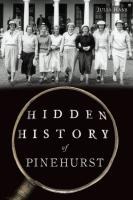Explore forgotten pieces of Pinehurst's past.
Pinehurst is called the "cradle of American golf," yet its origin story has nothing to do with tees, greens, or driving irons. Read about founder James Walker Tufts, who intended to use his fortune to build a health resort for people of modest means. Meet the famous caddies, respected for their knowledge of the tough Pinehurst courses and discover the movers and shakers of the Sandhills Women's Exchange. Learn about Annie Oakley, who taught thousands of women to shoot at the Pinehurst Gun Club. Enjoy profiles of women golfers like Babe Didrikson Zaharias and Peggy Kirk Bell, and step back into the bygone era of rogue tournaments and zany gymkhanas.
? Author Julia Hans recounts lesser-known stories of Pinehurst's multifaceted past.

